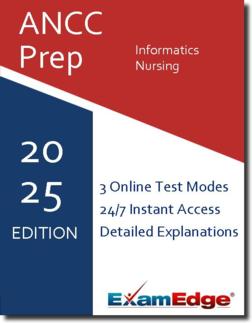ANCC Informatics Nursing (RN-BC Informatics) Practice Tests & Test Prep by Exam Edge - Blogs
Based on 29 Reviews
- Real Exam Simulation: Timed questions and matching content build comfort for your ANCC Informatics Nursing test day.
- Instant, 24/7 Access: Web-based ANCC Informatics Nursing practice exams with no software needed.
- Clear Explanations: Step-by-step answers and explanations for your ANCC exam to strengthen understanding.
- Boosted Confidence: Reduces anxiety and improves test-taking skills to ace your ANCC Informatics Nursing (NI-BC).



